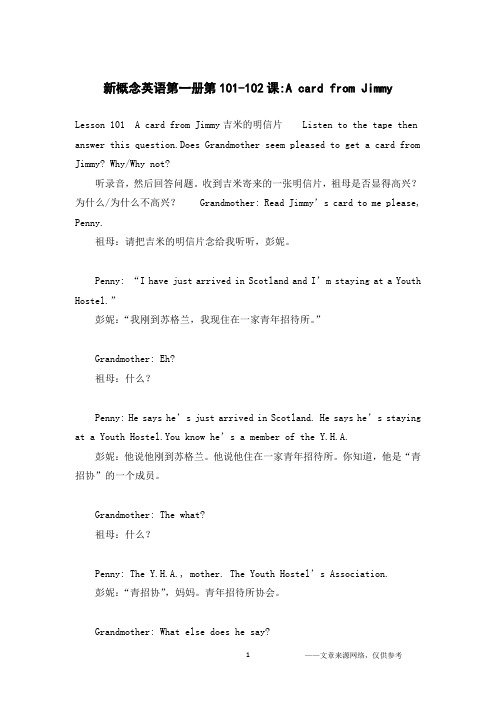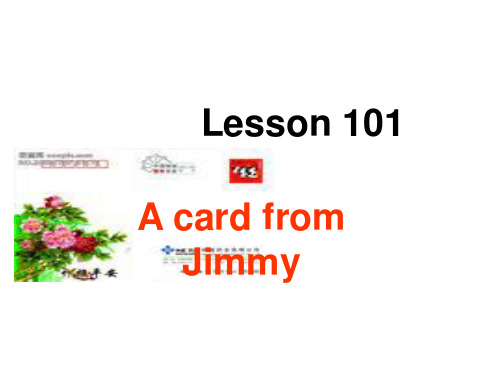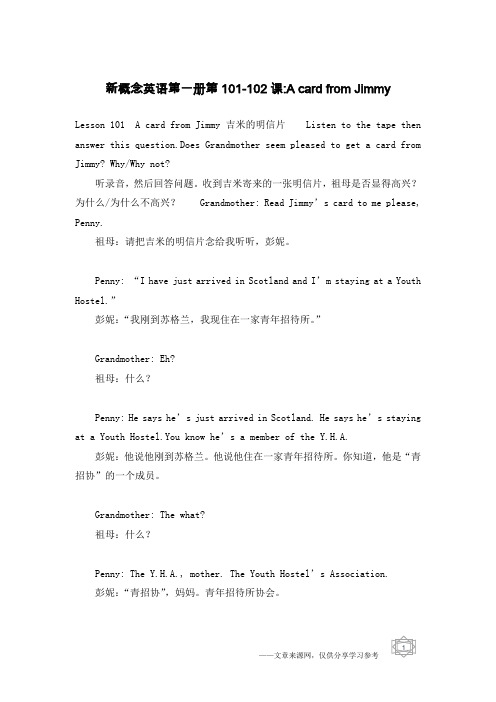新概念第一册101课
新概念一 101课

soon
adv.不久, 很快, 早
New Words
我们很快就 回来。
我们一会再见。
write v.写,写字;写作
他写了几本很有名的书。
New Words
He wrote some very famous books.
Play a game
不久
youth card
hotel
协会
卡 苏格兰 Scotland 青年
hostel
n.招待所
a hostel for the homeless
无家可归者的收容所
New Words
hotel
[həu'tel] n. 宾馆
association
n.协会,联盟
New Words
the Football Association
足球协会
association Youth Hostel Association
does
Where else Who else What else does he say?
will
I'll write write a a letter letter soon.
I hope you are all well.
Speak loudly
I'm afraid
I'm afraid I can't hear you.
答案
语法小结
“一随主”是指在直接引语变间接引 语时,如果从句中的主语是 第一人称或被第一人称所修饰。从句 中的人称要按照主句中主 语的人称变化如: She said. "My brother wants to go with me. "→ She said her brother wanted to go with her.
新概念英语第一册101课课件

• ‘I have just arrived in Scotland and I’m staying at a Youth Hostel.’ just 1、刚刚(完成时态) 她刚刚把钥匙给我。 He has just given the key to me. 他刚刚去图书馆。 She has just gone to the library. 2、正要…,刚要… (进行时态) 他们刚要作弊, 老 师过来了。 They were just cheating. The teacher came here. 他正要离开,他的父母打电话了。 He was just leaving. His parents called.
translation
n.苏格兰 n.明信片 n.青年 n.招待所,旅馆 n.协会 adv.不久 v.写
• youth 1)n. 青年人,年轻人(单复数同形) 该国的青年人 一 般都有礼貌 The youth of the nation is polite in general. 2)青年(少年)时期,青春时期 他少年时代在美国度过 He spent his youth in the U.S.A 他年轻时学过意大利语。 He studied Italian in his youth. 3)青春
Q&A
1.What does he say ? He says he’s just arrived in Scotland. He says he’s staying at a Youth Hostel. 2.What is the Y.H.A? The Youth Hostels Association. 3.What else does he say? He says he’ll write a letter soon. 4.Why doesn’t say very much? He can’t write very much on a card. 5.Does grandmother seem pleased to get a card from Jimmy? Why or why not? No , he doesn’t. Because he doesn’t write very much.
新概念英语第一册第101课PPT

He doesn't say very much,
does he?
PENNY:
He can't write very much on a
card, Mum.
Scot
land
Scotland
young youth
host
el
hostel
主人在侧房做了一个小旅馆。
so
on
soon
像这样在上面(作威作福)迟早要掉下来。
He’ll write a letter soon.
Please call me as soon as you arrive in Wu Han.
Don’t worry, I’ll call you sooner or later.
write v. 写
write down
write to
write off
'I have just arrive in Scotland and
I'm staying at a Youth Hostel.'
GRANDMOTHER: Eh?
PENNY:
He says he's just arrived in Scotland. He says he's staying at a Youth Hostel. You know he's a member of the Y.H.A.
that呢?
that 为连接词,做宾语可以 被省略
宾语从句(二)之直接引语和间接引语
▪ Penny says: “ He can't write very much on a card, Mum.”
新概念英语第一册第101-102课-A card from Jimmy

新概念英语第一册第101-102课:A card from JimmyLesson 101 A card from Jimmy吉米的明信片Listen to the tape then answer this question.Does Grandmother seem pleased to get a card from Jimmy? Why/Why not?听录音,然后回答问题。
收到吉米寄来的一张明信片,祖母是否显得高兴?为什么/为什么不高兴?Grandmother: Read Jimmy’s card to me please, Penny.祖母:请把吉米的明信片念给我听听,彭妮。
Penny: “I have just arrived in Scotland and I’m staying at a Youth Hostel.”彭妮:“我刚到苏格兰,我现住在一家青年招待所。
”Grandmother: Eh?祖母:什么?Penny: He says he’s just arrived in Scotland. He says he’s staying at a Youth Hostel.You know he’s a member of the Y.H.A.彭妮:他说他刚到苏格兰。
他说他住在一家青年招待所。
你知道,他是“青招协”的一个成员。
Grandmother: The what?祖母:什么?Penny: The Y.H.A., mother. The Youth Hostel’s Association.彭妮:“青招协”,妈妈。
青年招待所协会。
Grandmother: What else does he say?祖母:他还说了些什么?Penny: “I’ll write a letter soon. I hope you are all well.”彭妮:“我很快会写信的。
祝你们大家身体都好。
新概念英语第一册第101课

提问时间
• What is Penny doing? • For whom? • Whose card. • Where is Jimmy now? • Has Jimmy stayed in scotland for a long time? • Where is he staying now? • Why can he stay at a Youth Hostel? • Will Jimmy write a letter soon? • What does Jimmy hope? • Why does grandmother ask Penny to speak up?
• Jimmy wrote a lot on the card, didn't he?
• Is grandmother very happy about this?
课后作业
• 1、请完成练习册上的作业。 • 2、背诵课文。
新 概 念 英 语第 一 册
Lesson 101 A card from Jimmy
词 汇
• • • • • • • Scotland n. card n. youth n. hostel n. association n. soon adv. write(wrote, written) v. • • • • • • • • • business card birthday card name card postcard a youth of twenty youth club youth center hotel motel
反意疑问句:
• •
• • • • • • • • • • • •
首先,明白语法的含义。 询问某种情况是否真实,或者别人是 否同意自己。 分为两部分: 逗号前面为主句;后面为反意疑问句。 当前面是肯定句时,后面是否定句。 当前面是否定句时,后面是肯定句。 特点: 1. 问句的主语与主句的主语一致; 2.前后的助动词一致; 3.前后的时态一致。 Sally can speak French, can't she? Sally can't speak French, can she? 升调 - 表示疑问,期待对方回答。 降调 - 语气确定,不需要回答。
(推荐)新概念第一册101课-直接引语与间接引语1和反义疑问句概要

read sth to sb 读给某人听 read sth for sb 替某人读
P: He says he's just arrived in Scotland. He says he's staying at a Youth Hostel. You know he's a member of the Y.H.A.
card
n. 明信片
youth
n. 青年
hostel
n. 招待所,旅馆
association
n. 协会
sritten) v. 写
• 明信片的由来 :
• 1865年,德国有一位画家(名字未 考证)在一张硬纸上画了一幅画, 同时写上几句问候的话,打算寄给 他的朋友,但找不到有这多大的信 封来装寄,后来在邮局职员的建议 下,这画上图案的硬纸背后上,写 上朋友的地址和姓名寄出,这就是 明信片的鼻祖。
该国的青年人 一 般都有礼貌
The youth of the nation is polite in general. 2)青年(少年)时期,青春时期 他少年时代在美国度过
He spent his youth in the U.S.A 他年轻时学过意大利语。
He studied Italian in his youth. 3)青春
你报告写好了没有? 用英文写
write in English Write to sb. 给某人写信 我一个月给我家人写两封信。 I write to my family twice a month.
G: Read Jimmy's card to me please, penny.
P: 'I have just arrived in Scotland and I'm staying at a Youth Hostel.'
新概念英语第一册101-102课课件 (共43张PPT)

When else can we meet again? • 你还去过其它什么地方?
Where else have you been? • 还有谁能做这件事?
Who else can do it?
• He doesn’t say very much, does he?
They were just cheating. The teacher came here. • 他正要离开,他的父母打电话了。
He was just leaving. His parents called.
• arrive in + 城市/国名(大地点) • 她昨天到了马德里。
She arrived in Madrid yesterday. • arrive at +公共场所地点名称(airport, park,
He is an engineer, isn’t he? 实际情况:He is an engineer. --Yes, he is. • 他不是一个工程师,是吗? He isn’t an engineer, is he? Yes, he is.
翻译句子
• 今天天气真好,不是吗?(反义疑问句) • 她上个月去了巴黎,是吧? 是的,她去了。 • 他说他要去美国了。(say that) • 恐怕我看不太清楚。(be afraid that) • 你没去上学,对不对? • 你根本没给他打过电话,是吗?! • 他们说老师马上就回来。(say that) • 我朋友说他要给我寄明信片。(say that) • 我的新家离你很近,不是吗?(反义疑问句) • 你不爱喝咖啡,对吗? • 你今天又迟到了,是不是?
新概念一101课Lesson101-直接-间接引语

• 10.He won’t come tonight. I think.(同上) • I _don’t_ think _that_ he _will__come tonight. • 11.He can’t write very much on a card,_can_ _he_?(反意疑问句) • 12.Read this part to me .(同义句) • Read _me_ this _part__.
• 4.He says he’ll write a letter soon. • “____ ___ write a letter soon.” he says. • 5.I have just arrived in Scotland.” Jimmy says to his mother . • Jimmy ___his mother that he ___ just ___in Scotland. • 6. “When did the train leave?” Jason asks the porter. • Jason asks the porter ___the train ___.
17.Steven says he is_ ill now.(feel) 18.Mr.williams says that he will_his old house next week.(sell) 19.She knows that she must _for the bus at the bus stop.(wait) 20.Dose he believe that he can_his work at once(finish) 21.This little child says she_very tired now.(be) 22.The teacher says that Tom always__hard.(work) 23.I am sure that my sister have _ the cheese(eat)
新概念1册第101课

•2. wrong •3. stand up •4. buy •5. cold
练习册P145 A
• • • • • • • • •
2. She thinks that she has got a cold. 3. I know that I need an X-ray. 4. We know that he can swim well. 5. They believe that she is ill. 6. I'm sure that he will sell his house. 7. I'm sure that she is at home today. 8. I'm sorry that she is ill. 9. I'm afraid that you are wrong. 10. I understand that you need money.
GRANDMOTHER: What else does he say? PENNY: 'I'll write a letter soon. I hope you all well.' GRANDMOTHER: What? Speak up. Penny. I'm afraid I can't hear you. PENNY: He says he'll write a letter soon. He hopes we are all well. 'Love, Jimmy.' GRANDMOTHER: Is that all? He doesn't say very much, does he? PENNY: He can't write very much on a card, Mum.
新概念第一册101课

• 我一个月给我家人写两封信。 • I write to my family twice a month.
单词:
• • • • • • • Scotland n. 苏格兰(英国) card n. 明信片 youth n. 青年 hostel n. 招待所,旅馆 association n. 协会 soon adv. 不久 write (wrote, written) v. 写
• He doesn‟t say very much, does he? • No, he doesn‟t. 是的,他没说多少。 • Yes, he does. 不,他说了挺多。
翻译下列句子
• 今天天气真好,不是吗? • Today is a nice day, isn’t it? • 她上个月去了巴黎,是吧? 是的,她去了。 • She went to Paris last month, didn’t she? Yes, she did. • 他说他要去美国了。 • He says he will go to America. • 恐怕我看不太清楚。 • I’m afraid that I can’t see clearly. • 你没去上学,对不对? • He doesn’t go to school, does he?
• card • post card
n. 明信片,卡片 明信片
credit card
信用卡
an ID card
身份证
a birthday card
生日卡片
名片:name card
a new year card
新年贺卡
n.扑克、纸牌
• Play cards • 打扑克
• • • • • • • • • •
新概念一册101到110课原文及译文

Lesson 101 A card from Jimmy吉米的明信片GRANDMOTHER: Read Jimmy's card to me please, Penny.请把吉米的明信片念给我听听,彭妮。
PENNY: 'I have just arrive in Scotland and I'm staying at aYouth Hostel.' “我刚到苏格兰,我现住在一家青年招待所。
”GRANDMOTHER: Eh? 什么?PENNY: He says he's just arrived in Scotland.他说他刚到苏格兰。
He says he's staying at a Youth Hostel.他说他住在一家青年招待所。
You know he's a member of the Y.H.A.你知道,他是“青招协”的一个成员。
GRANDMOTHER: The what? 什么?PENNY: The Y.H.A., Mum. “青招协”,妈妈。
The Youth Hostels Association. 青年招待所协会。
GRANDMOTHER: What else does he say? 他还说了些什么?PENNY: I'll write a letter soon. “我很快会写信的。
I hope you all well. '祝你们大家身体都好。
”GRANDMOTHER: What? Speak up. Penny. 什么?彭妮,大声一点。
I'm afraid I can't hear you 我可听不见你念的。
PENNY: He say he'll write a letter soon. 他说他很快会写信的。
He hopes we are all well. 他祝我们大家身体好。
新概念第一册第101-102课重点知识

Lesson101-102a card from Jimmy 注意from在这里表示来自某人的东西,I have just arrived in Scotland.我刚到苏格兰,注意现在完成时。
I'm staying at a Youth Hostel.我现在住在了一个青年旅馆。
(hotel宾馆、酒店,hostel招待所、旅馆)a member of成员、会员,association协会,What else does he say?他还说了什么?Speak up!大声点说话!I'm afraid I can't hear you.我听不见。
Is that all?就这些?He can't write very much on a card.在明信片上他可不能写太多。
He hopes we are all well.他希望我们一切都好。
语法难点解析:你能找找这些句子的共同点并翻译一下吗?He says he is tired. She says she feels ill. They say they need some money. She says she has got an earache. He says he needs a licence. They say they will repair the car. She says she must wait for a bus.反意疑问句的使用规律是“前否后肯,前肯后否”。
请看例句:He doesn't say very much, does he? She is very tired, isn't she? Don't sell this house, will you? French tests are awful, aren't they?法语考试太可怕了,是吗?。
新概念英语第一册101-102课PPT

Lesson 102 He said he …
She says she …
They say they … 1 T: Look at number 3. I am cold. What's that? S: She says she is cold. 2 T: Number 5. I have a cold. What's that? S: He says he has a cold.
Lesson 102 A 1 She says she has shut the door. 2 He says he has put on his coat. 3 He says he has read this magazine. 4 They say they have spoken to the boss. 5 They say the sun has risen.
Grammar in use: 直接引语和间接引语
1 .直接引语就是直接引用说话人原来所说的话; 间接引语就是原话的转述。直接引语放在引号里, 间接引语是把说话人的原话变成宾语从句。 2 .间接引语中,宾语从句中的动词与主句中的主 要动词在时态上必须保持一致。一般来说,主要 动词用现在时,间接引语中可用现在时(包括一 般现在时、现在进行时、现在完成时)和将来时。 如:
Asking questions: Ake me if…?
1 T: Jimmy has just arrived in Scotland. S: Has Jimmy just arrived in Scotland? T: Where ⋯ ? S: Where has Jimmy just arrived? 2 T: Ask me if he's staying at a Youth Hostel. S: Is he staying at a Youth Hostel? T: Where ⋯ ? S: Where is he staying?
新概念英语第一册101课课文

新概念英语第一册101课课文Lesson 101:A card from Jimmy 吉米的明信片Listen to the tape then answer this question.Does Grandmother seem pleased to get a cardfrom Jimmy?Why/Why not?听录音,然后回答问题。
收到吉米寄来的一张明信片,祖母是否显得高兴?为什么/为什么不高兴?GRANDMOTHER: Read Jimmy's card to me please, penny.PENNY: 'I have just arrive in Scotland and I'm staying at a Youth Hostel.'GRANDMOTHER: Eh?PENNY: He say he's just arrived in Scotland.He says he's staying at a Youth Hostel.You know he's a member of the Y.H.A.GRANDMOTHER: The what?PENNY: The Y.H.A., Mum.The Youth Hostels Association. GRANDMOTHER: What else does he say? PENNY: 'I'll write a letter soon.I hope you all well.'GRANDMOTHER: What? Speak up. Penny.I'm afraid I can't hear youPENNY: He say he'll write a letter soon.He hopes we are all well. 'Love, Jimmy.' GRANDMOTHER: Is that all?He doesn't say very much, does he?PENNY: He can't write very much on a card, Mum. 生词和短语Scotland n. 苏格兰(英国)card n. 明信片youth n. 青年hostel n. 招待所,旅馆association n. 协会soon adv. 不久write (wrote, written) v. 写参考译文祖母:请把吉米的明信片念给我听听,彭妮。
新概念英语第一册第101-102课-A card from Jimmy

新概念英语第一册第101-102课:A card from JimmyLesson 101 A card from Jimmy吉米的明信片Listen to the tape then answer this question.Does Grandmother seem pleased to get a card from Jimmy? Why/Why not?听录音,然后回答问题。
收到吉米寄来的一张明信片,祖母是否显得高兴?为什么/为什么不高兴?Grandmother: Read Jimmy’s card to me please, Penny.祖母:请把吉米的明信片念给我听听,彭妮。
Penny: “I have just arrived in Scotland and I’m staying at a Youth Hostel.”彭妮:“我刚到苏格兰,我现住在一家青年招待所。
”Grandmother: Eh?祖母:什么?Penny: He says he’s just arrived in Scotland. He says he’s staying at a Youth Hostel.You know he’s a member of the Y.H.A.彭妮:他说他刚到苏格兰。
他说他住在一家青年招待所。
你知道,他是“青招协”的一个成员。
Grandmother: The what?祖母:什么?Penny: The Y.H.A., mother. The Youth Hostel’s Association.彭妮:“青招协”,妈妈。
青年招待所协会。
Grandmother: What else does he say?祖母:他还说了些什么?Penny: “I’ll write a letter soon. I hope you are all well.”彭妮:“我很快会写信的。
祝你们大家身体都好。
新概念英语第1册第101-102课重点语法

新概念英语第1册第101-102课重点语法第101-102课的内容:一、重要句型或语法1、宾语从句(间接引语)1)用来作宾语的句子叫做宾语从句,如:He says he's just arrived in Scotland. 在第102课里,教材罗列了常见的宾语从句的主句动作。
2)本课侧重间接引语的内容,并且是省略连接词that的用法。
如:He says he's staying at a Youth Hostel.2、非谓语动词这里所指的非谓语动词不是通俗意义上所指的动名词、分词和不定式,而是广义上说的所有不能直接做谓语的动词。
在第102课,教材汇总了之前学过的非谓语动词,即系动词(状态系动词be和感官系动词)、助动词(will)和情态动词(can、must和need)。
二、课文主要语言点Read Jimmy's card to me please, Penny. read...to sb.,读...给某人听。
I have just arrived in Scotland and I'm staying at a Youth Hostel.' 1)可提问学生为什么此处两个动词分别采用了现在完成时和现在实行时。
2)提问学生两句话中地点的前面为什么一个用in,另一个却用at。
3)youth,青年。
hostel,招待所、宾馆。
He says he's just arrived in Scotland. He says he's staying at a Youth Hostel. 解读省略that的间接引语。
You know he's a member of the Y. H. A. 1)本句的you know后面接的是省略连接词that的宾语从句,可参考教材第207页表格中的宾语从句的种类汇总。
2)the Y. H. A.,完整形式为:the Youth Hostels Association,青年招待所协会。
- 1、下载文档前请自行甄别文档内容的完整性,平台不提供额外的编辑、内容补充、找答案等附加服务。
- 2、"仅部分预览"的文档,不可在线预览部分如存在完整性等问题,可反馈申请退款(可完整预览的文档不适用该条件!)。
- 3、如文档侵犯您的权益,请联系客服反馈,我们会尽快为您处理(人工客服工作时间:9:00-18:30)。
写出下列句子的反义疑问句
doesn‟t he He does his homework every day, ___________? aren‟t they They are teachers, _____________? can‟t she She can dance, _____________? is she Tom isn‟t reading a magazine, ______________? They cleaned the classroom yesterday afternoon, didn‟t they _____________? haven‟t you You have done the work, ______________? aren‟t they Everyone is in the classroom, _____________? hadn‟t you You‟d better go to bed early, ______________? doesn‟t she Mary studies very hard, _________________? have you You haven‟t seen the film yet, ____________?
介词总结:
• at: 几点+小地点+学校/家(school/home) +中午/晚上(noon/night) • in:年份+月份+大地点+国家+早、中、晚 (morning/afternoon/evening) • on:几月几日--“逢日必on”
直接引语和间接引语
• 直接引语就是直接引用说话人原来所说的 话,而间接引语就是原话的转述。 • 直接引语放在引号里,间接引语是把说话 人的原话变成宾语从句。 • 直接引语变间接引语须在人称,时态及地 点状语等方面作相应的变化。
He doesn‟t say very much, does he?
•反意疑问句
重点句型
• 反义疑问句: 有两部分组成,前一部分是陈述句, 逗号之后是一个简略问句。反义疑问句可以用来 肯定自己的判断,获取真实的信息,还可以用来 表达惊讶、愤怒的感情。如果前一句陈述句是肯 定形式,后面的简略问句就是否定形式,如果陈 述句是否定形式,简略问句就是肯定形式。回答 则要根据实际情况作答。
Game:
• • • • • 1._ _ _ _ _ 2._ _ _ _ _ _ _ _ _ _ _ 3._ _ _ _ 4._ _ _ _ _ _ _ _ 5._ _ _ _ _ _
Listen and answer:
• 1.Where is Jimmy now? • 2.Does Jimmy say very much? Why? • 3.What does grandmother want Penny to read to her? • 4.What does Jimmy‟ s card say? • 5.Who are they?
• 我一个月给我家人写两封信。 • I write to my family twice a month.
单词:
• • • • • • • Scotland n. 苏格兰(英国) card n. 明信片 youth n. 青年 hostel n. 招待所,旅馆 association n. 协会 soon adv. 不久 write (wrote, written) v. 写
• „I have just arrived in Scotland and I‟m staying at a Youth Hostel.‟ • just • 1、刚刚(完成时态) • 她刚刚把钥匙给我。 • He has just given the key to me. • 2、正要…,刚要… (进行时态)
• 如果直接引语为祈使句,变为间接引语时 多用“名词(代词)+不定式”结构。 • 1)引述表示命令的祈使句,常用动词order, tell, warn; • 2)引述表示请求的祈使句,常用动词ask, beg; • 3)引述表示建议、劝告的祈使句,常用动词 advise等。 • The boss said,“Please come here again tomorrow.” • --The boss asked me to go there again the next day.
Scotland n.苏格兰(英国)
card
youth
n.明信片
n.青年
hostel
association
n.招待所,旅馆
n.协会
soon
adv.不久
write (wrote, written) v. 写
• card • post card
n. 明信片,卡片 明信片
credit card
信用卡
an ID card
身份证
a birthday card
生日卡片
名片:name card
a new year card
新年贺卡
n.扑克、纸牌
• Play cards • 打扑克
• • • • • • • • • •
youth 1)n. 青年人,年轻人(单复数同形) 这个国家的青年人 很有礼貌。 The youth of this nation is polite . 2)青年(少年)时期,青春时期 他少年时代在美国度过 He spent his youth in the U.S.A 他年轻时学过意大利语。 He studied Italian in his youth. 3)青春
• sooner or later 迟早
• --write v. 写(wrote written) • 请你把姓名,地址写在这里。 • Write your name and address here, please.
• write in English 用英文写 • Write down 写下来 • Write to sb. 给某人写信
Review:
翻译99课宾语从句:
• • • • • 1.我想我把背摔坏了。 2.我恐怕站不起来。 3.我想最好请医生来给你看下。 4.医生说他马上就来。 5.我看你需要做一次X光透视。
Lesson101 A card from Jimmy 吉米的明信片
New words and expressions
You know he‟s a member of the Y.H.A.
• a member of… • the Y.H.A=? “…一员”
• • • • • • • • • • • • •
What else does he say? What else 其它什么 When else 其 它什么时间 Where else 其它什么地方 Who else 其它什么人 你还想要其它什么东西? What else do you want? 其它什么时间我们再见面呢? When else can we meet again? 你还去过其它什么地方? Where else have you been? 还有谁能做这件事? Who else can do it?
2. 如果直接引语为疑问句,变为间接引语时 关联词用whether, if 或其他疑问词;词序与 一般从句相同,引述动词常用say, ask, wonder等。 • “Is he your brother?” he said. • He asked if he was my brother. • Mr. Smith asked, “What is your name?” • Mr. Smith asked what my name was.
• • • • • • • • • • • •
你根本没给他打过电话,是吗? You didn’t call him at all, did you? 他们说老师马上就回来。 They say the teacher will come back at once. 我朋友说他要给我寄明信片。 My friend says he will send me a card. 我的新家离你很近,不是吗? My new home is near yours, isn’t it? 你不爱喝咖啡,对吗? You don’t like to drink coffee, do you? 你今天又迟到了,是不是? You are late again, aren’t you?
课文讲解
• • • • • • • Read Jimmy‟s card to me please, Penny. read sth to sb 把…读给…听 read sb sth 读这份报纸给我听。 Read the newspaper to me. 你能给我读一下这封信吗? Can you read the letter to me?
1.如果直接引语为陈述句,变为间接引语时 常用从属连词that引导(口语中可省略), 引述动常常用say, tell等。同时,概据主 语的要求,间接引语须在人称,时态及其 它方面作相应的变化。 • She said to me,“I have left my book in your room.” • She told me that she had left her book in my room.
• • • • • • •
soon adv.
1)不久 他不久就会回来。 He will be back soon. 2)(比预定)快,早 Winter has come too soon. 冬天来得太早了
• as soon as 一…就… • 我一见到他就会告诉他这个消息。 • I‟ll tell him the news as soon as I see him.
呆在Biblioteka • arrive in + 城市/ 国名(大地点) • 她昨天到了马德里。 • She arrived in Madrid yesterday.
